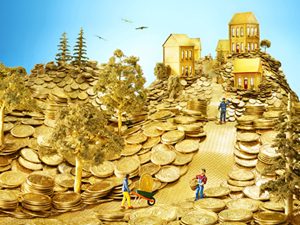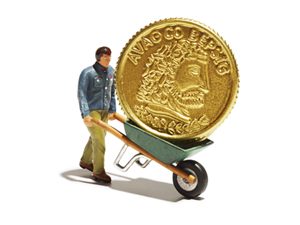 Except for one unlucky resident, everyone in this debt-ridden farming
community became incredibly wealthy when their lottery numbers were
called. But here's what they really won.
Except for one unlucky resident, everyone in this debt-ridden farming
community became incredibly wealthy when their lottery numbers were
called. But here's what they really won.
Dan Saelinger for Reader’s Digest
At Bar Cañamoto, the town’s sole drinking establishment, you’ll usually find a half dozen residents drinking botellitas of Estrella beer after a long day of laboring in the fields. But unlike the locals in other towns, these farmers and truck drivers pay for their one-euro beers with 50-euro bills, and the mood is always jovial, like they haven’t a worry in the world. “People are happier now,” explains Pedro, a 33-year-old long-distance truck driver, as he breaks into a smile.
On December 22, 2011, at 9:57 a.m., the entire population of Sodeto became winners of the biggest lottery in the world. La Lotería de Navidad, or El Gordo (“The Fat One”), as it is known, dishes out as much as two billion euros every year in prize money, and in 2011, everyone in Sodeto held a portion of the winning number. As El Gordo was announced on television, Sodeto’s residents streamed out of their homes and into the square, embracing and shrieking in disbelief. “I had four tickets. How many did you have?” “I had seven!” “I had 12!”
Tears and champagne flowed as the realization set in that every single person in Sodeto had won a share of the largest amount of prize money, worth a combined 720 million euros. (Everyone, that is, except for one resident, but more about him later.)
Exactly who won how much is a secret. Suffice it to say, every single family in Sodeto had at least one winning participación, and some had bought enough to make them millionaires.
In an instant, Sodeto had become the subject of an unintentional social experiment: What happens when an entire debt-ridden farming community suddenly becomes incredibly wealthy? The press arrived quickly. Salespeople swarmed the town, flooding residents with offers of sports cars, diamonds, and exotic vacations. Bankers hawked various investments. Garbage bins that rarely needed emptying suddenly overflowed with flyers.
“Oh, it’s gotten better,” admits Herminia Gayán. Her family had four participaciones, so they won 400,000 euros. The 78-year-old grandmother sits at her long kitchen table in a floral smock and slippers stirring aioli for the dinner she’ll later serve to her family. Chicken sizzles in the oven, and wood crackles in the huge fireplace that dominates the front room of every house in Sodeto.
Gayán was one of the original settlers here. Sodeto was created in 1950, one of more than 200 planned communities created by former dictator Francisco Franco across the Spanish countryside to populate under-farmed areas. Gayán and her now-deceased husband were given a house, a barn, some land, and a few farm animals.
For the first four years, there were only seven families, working the land and fending for themselves. Eventually, more than 65 families settled in the town. “We had 14 cows in the backyard,” says Gayán proudly. Her blue-eyed son, a 54-year-old farmer named José and the town’s official pig slaughterer, chimes in when the lottery is mentioned. “You didn’t have anything before, and in this moment, you have everything,” he says, lighting a cigarette. The mother and son happily relive those first moments after learning about the victory but then grow serious. “As the hours go by, you calm down,” says José, blowing smoke into the roaring fireplace. “The people didn’t go crazy. They didn’t buy and spend.”
In fact, in the months after the win, there was no change at all, he says. But come April, the streets were filled with trucks and construction companies performing renovations on virtually every house in town. But beyond that, it’s hard to identify any major change in the sleepy village. Perhaps most remarkable is the fact that nobody has stopped working—as farmers, truck drivers, and housewives.
As we talk, family and friends stream in and out. Perhaps it’s because Sodeto was a deliberately planned community, but there’s a familial sense of camaraderie and togetherness that is stronger here than in other Spanish towns. Yet after the lottery win, more often than not, it was a reporter and not a friend who wandered in, and one always armed with the same question: “Why didn’t you take the money and leave?” Gayán finds the inquiry perplexing. “Where would I go?” she asks with a shrug. “I won with all these people.”
Well, almost all of them. A converted barn owned by Costis Mitsotakis sits on a hill a mere two-minute drive from Sodeto’s center, a distance he says that may have cost him a winning ticket in El Gordo. The Greek documentary filmmaker moved here eight years ago to pursue a relationship with a resident, but it didn’t work out. He says that members of the Housewives’ Association never knocked on his door. “It took me a couple of days to discover I was the only one who had missed out,” he says. And yet in some ways, even Mitsotakis is a winner.
On the morning of December 22, he was in the village square with his video camera, capturing the jubilant celebrations. Those incredible shots are included in Cuando Tocó (“When Touched”), a documentary Mitsotakis made about Sodeto and El Gordo. His original intention was to document how the lottery would change the town, but his focus quickly shifted to why the town didn’t change more.
“Everyone had his or her feet on the ground after the lottery,” says Rosa Pons Serena. At 54, Serena has been mayor of Sodeto for 14 years, and she knows the town’s short history well.
“What we won was peace of mind,” she says. We’re walking through the town’s small visitors’ center, and she stops in front of a diorama of the hills and fields that surround Sodeto.
“Instead of the old irrigation system”—Serena points to miniature canals that snake through much of the diorama—“we’re modernizing.” She gestures to another part of the diorama, where fields are dotted with evenly spaced automated sprinklers. Nearly everyone in the town had invested heavily in these new systems, and many people were in debt. She explains that with an economic base in animals and agriculture, everything depends on the land—and sometimes it can be unkind. “When they played the lottery, many couldn’t plant, because there was a drought,” says Serena.
During that time, talk in the bar was tense, Serena recalls. The question patrons asked was always “How will I pay?” If conversation wasn’t about the irrigation systems and the drought, it would turn to the economic crisis in Spain or the fact that one by one, the youth of Sodeto were leaving to search for work in the nearby city of Huesca. “And then, in one second, all the mortgages disappeared,” says Serena.
No one took his or her winnings and split. In fact, three of the town’s young people actually returned to buy land and build houses. In a nearly deserted area of an economically depressed country, those suddenly blessed with the freedom to do anything simply chose to stay put.
For Serena, it’s not a mystery. “This morning, my neighbor called me to come have a coffee, and I went in my housecoat,” explains the mayor. “These little things give us our quality of life.”
And of course, there’s another question that these lucky residents have been compelled to consider: Why did the lottery land here, in Sodeto? The answer is usually a smile and a shrug. Serena is one of the few who are willing to give the windfall meaning: “It was a prize for those who stayed.” For Serena, Gayán, and their beloved neighbors, it’s simple: There’s nowhere else they’d rather be.
Source: readersdigest.com



